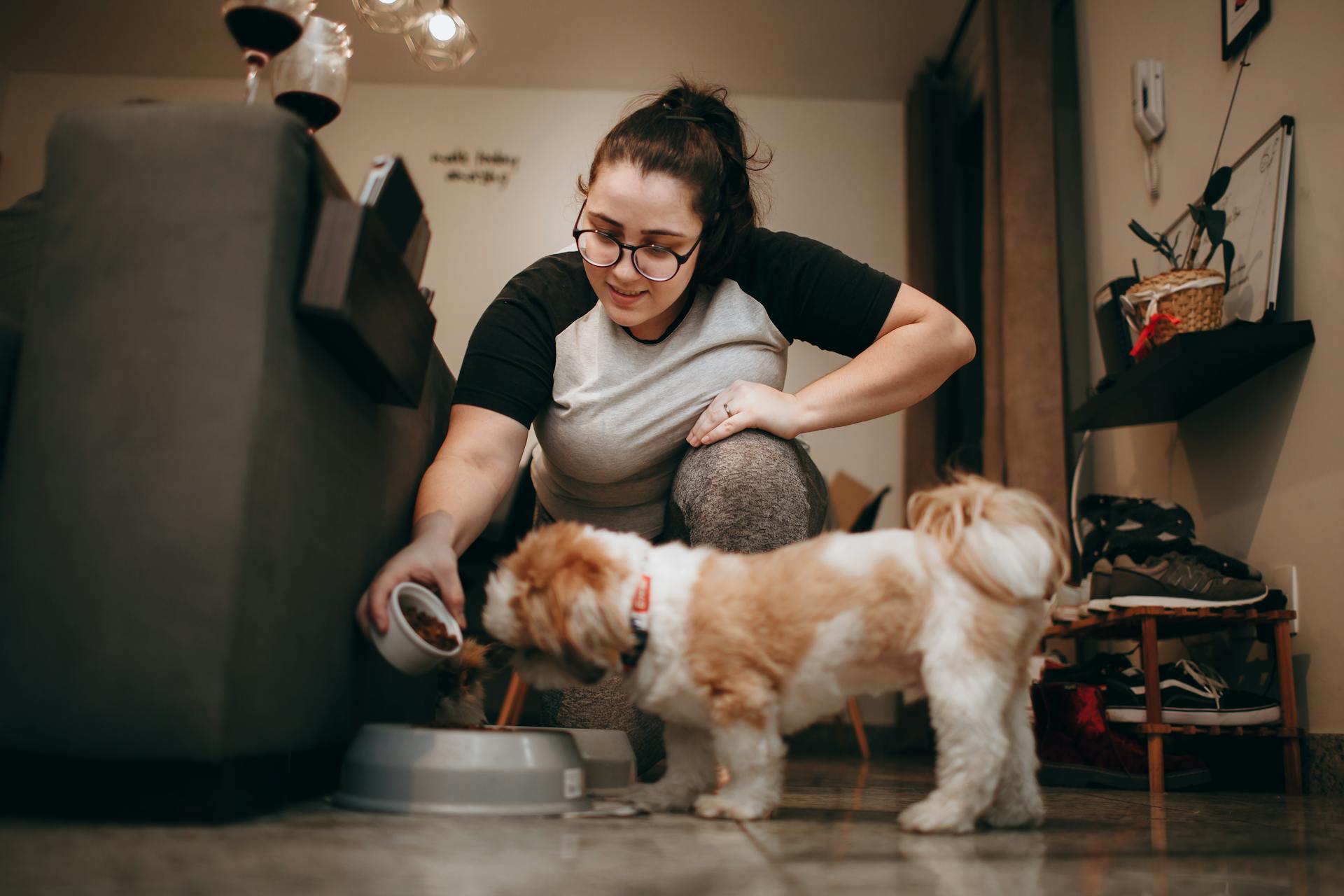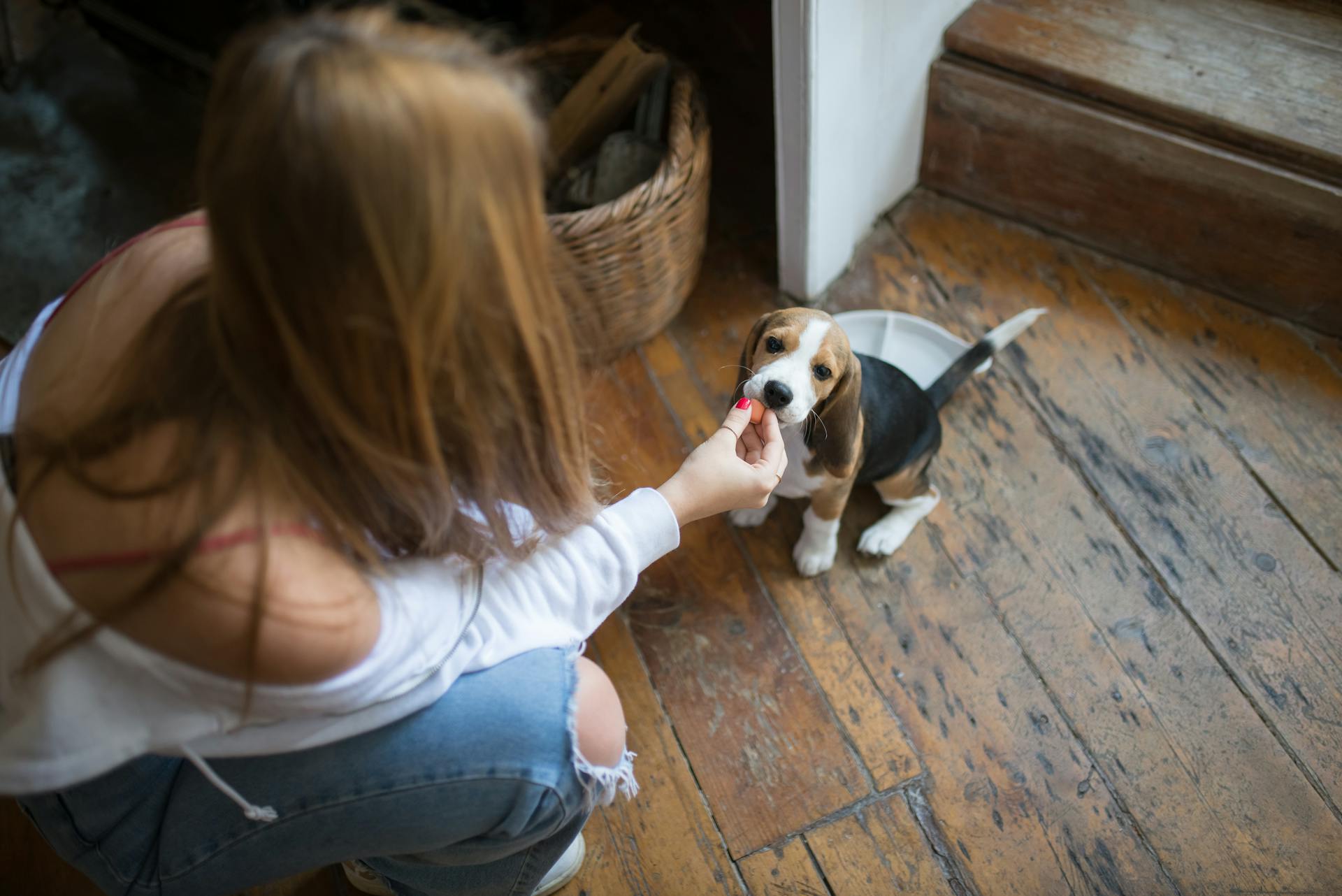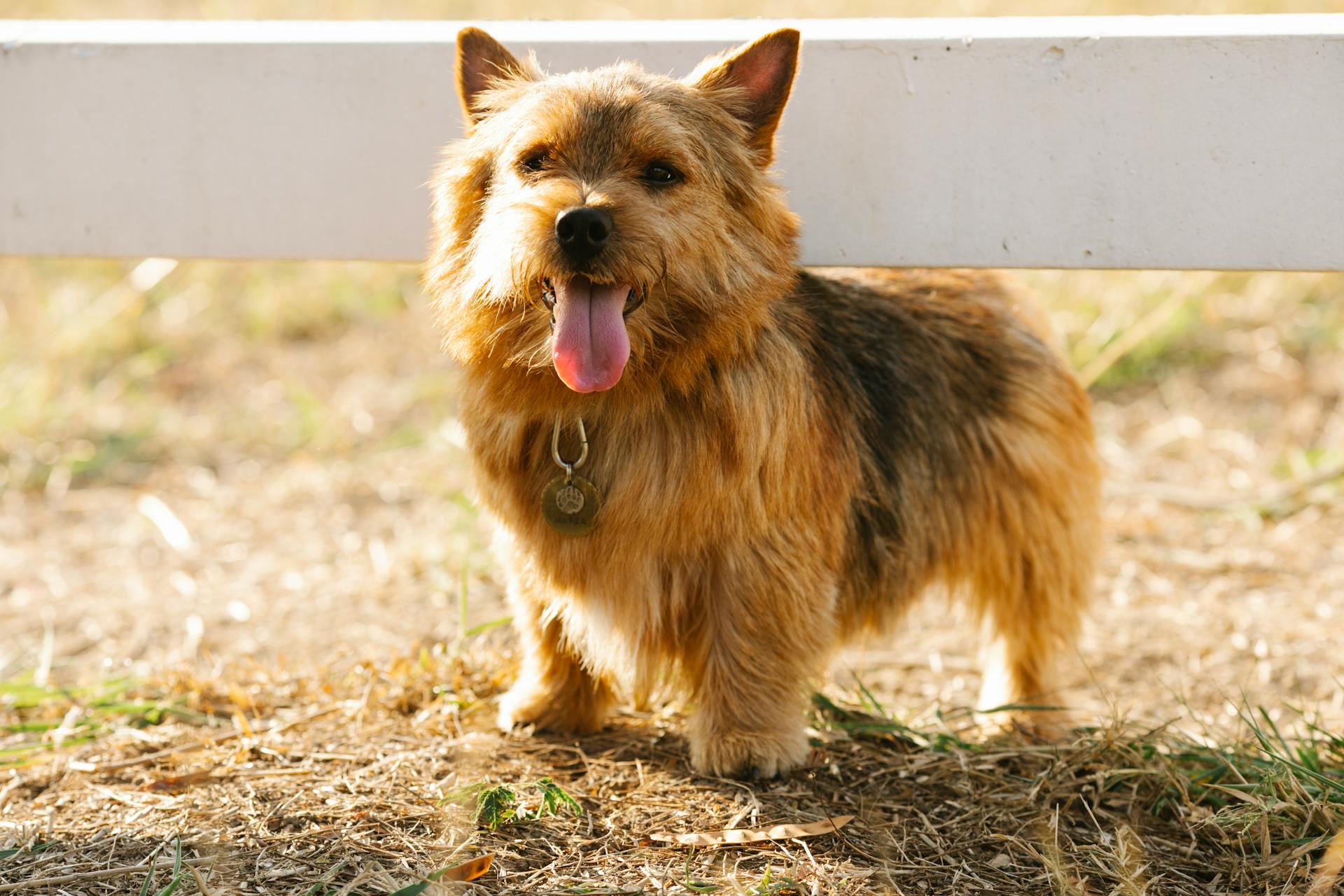
A Shih Poo's ideal weight range is between 9 and 16 pounds, and their daily caloric needs vary accordingly. Generally, a Shih Poo requires 1/2 to 3/4 cup of food per 10 pounds of body weight per day.
Their adult diet should consist of high-quality dog food with a balanced mix of protein, fat, and complex carbohydrates. Aim for a food with at least 22% protein and 10% fat content.
A fresh viewpoint: Havanese Feeding Chart
Feeding Basics
Shih Poos require a moderate amount of high-quality protein in their diet to maintain healthy muscles and overall growth. This can come from lean meats, poultry, fish, or plant-based options like beans and lentils.
Protein makes up a significant part of a Shih Poo's diet, but it's not the only essential nutrient. Healthy fats are also crucial for energy and maintaining a shiny coat, with sources like fish oil and flaxseed oil providing omega-3 fatty acids.
Carbohydrates should make up a smaller portion of a Shih Poo's diet, with complex carbohydrates like brown rice and sweet potatoes being preferred. These provide sustained energy and fiber for digestion.
Here's an interesting read: Is High Protein Dog Food Good for Dogs
A well-balanced commercial dog food typically meets a Shih Poo's nutritional requirements, including vitamins A, C, D, E, and essential minerals like calcium, phosphorus, and potassium.
Shih Poos need access to clean, fresh water at all times to stay hydrated and maintain overall health.
Here are some general feeding guidelines for Shih Poos:
- Establish a regular feeding schedule to help with digestion and avoid overeating.
- Avoid leaving food out all day for your Shih Poo to graze, as this can lead to obesity.
- Store dry dog food in a cool, dry place to maintain its freshness and prevent spoilage.
- Refrain from feeding your Shih Poo table scraps, as many human foods can be harmful to dogs.
- Use treats in moderation to avoid excessive calorie intake.
- Regularly assess your Shih Poo's body condition by feeling for their ribs and monitoring their weight.
The feeding guideline on the packaging of your dog's food is a good place to start, but keep in mind that every dog is different and may require adjustments to their diet over time.
Nutritional Requirements
A Shih Poo's nutritional requirements are crucial for their overall health and well-being. They require a balanced diet that meets their unique needs.
Shih Poos are a cross between a Shih Tzu and a Poodle, and as such, they can be prone to obesity if not fed correctly. Their ideal weight is between 9-16 pounds.
A Shih Poo's daily caloric needs depend on their age, size, and activity level. Puppies require more calories than adult dogs, with a recommended daily intake of 1/4 to 1/2 cup of food per 10 pounds of body weight.
Recommended read: Shih Poo Weight
Shih Poos are sensitive to certain ingredients, including beef, dairy, and soy, which can cause digestive issues. They require a high-quality dog food that is formulated specifically for small breeds.
A Shih Poo's nutritional requirements also include essential vitamins and minerals, such as vitamin D and calcium, which support bone health and development.
Feeding Options
If you're considering a Shih Poo's dietary needs, you have several options to choose from. You can offer a wet diet, which is frequently preferred by dogs due to their texture and flavor profile.
Wet foods provide lots of moisture, which can be beneficial for dogs with kidney or bladder issues. They may also be easier for older animals and those with dental disease to eat.
Dry foods, on the other hand, are easy to weigh and measure out, and can be stored for a long time in large containers. They are also nutrient and calorie dense, and can improve dental health and reduce tartar build-up.
You might like: How to Make Dog Treats from Wet Food
Here are some key points to consider:
- Wet foods: high moisture content, easier to digest for older dogs or those with dental disease
- Dry foods: easy to measure, store for long periods, nutrient and calorie dense, improves dental health
It's worth noting that dry foods contain little moisture, so may not be suitable for dogs with kidney or bladder disease.
Commercial Food vs Homemade
Commercial dog food is a convenient option for many pet owners, but it's not the only choice for your Shih Poo. Both have their pros and cons, and the choice ultimately depends on your lifestyle and your dog's specific needs.
One major advantage of commercial dog food is that it's formulated to meet a dog's nutritional needs, but some owners may be concerned about the quality of ingredients used. Many commercial dog foods contain fillers and by-products that can be detrimental to your dog's health.
Commercial dog food can also be more cost-effective than a homemade diet, especially for larger or more active dogs. However, some owners may be willing to pay a premium for the peace of mind that comes with knowing exactly what their dog is eating.
A homemade diet can be tailored to your dog's specific needs and allergies, but it requires careful planning and research to ensure nutritional balance.
Wet or Dry Options
If you're deciding between wet and dry dog food, it's worth considering the pros and cons of each option.
Dogs frequently prefer wet food due to its texture and flavour profile, which can make mealtime more enjoyable for them.
Wet foods provide lots of moisture, which can be beneficial for dogs with kidney or bladder issues.
On the other hand, dry foods are easy to weigh and measure out, making it simple to ensure your dog is getting the right amount of food.
Dry foods are also nutrient and calorie dense, which can be helpful for dogs that need a high-energy diet.
However, dry foods contain little moisture, which may not be suitable for dogs with kidney or bladder disease.
Here's a quick comparison of the two options:
Ultimately, the decision between wet and dry dog food will depend on your dog's individual needs and preferences.
Feeding Schedules
Feeding schedules for your Shih Poo are crucial to maintain a healthy weight and prevent overeating. Establish a regular feeding schedule to help with digestion.
You should feed your Shih Poo at least twice a day, as puppies need to be fed more frequently. Typically, young puppies are fed four times a day, but this can be tapered down to three times a day once they reach three months old.
For adult Shih Poos, the feeding schedule can vary depending on their size and activity level. Some may prefer to eat once a day, while others may need two meals a day to stay fueled.
To determine the best feeding schedule for your Shih Poo, monitor their body condition by feeling for their ribs and checking their weight. Adjust their diet accordingly to ensure they are at a healthy weight.
Here's a general guideline for feeding your Shih Poo:
Remember to provide fresh water at all times and store dry dog food in a cool, dry place to maintain its freshness.
Weight Management
Maintaining a healthy weight is crucial for your Shih-Poo's overall health and well-being. This involves a balanced diet with the right proportions of quality protein, healthy fats, ground bone, offal, and vegetables.
Broaden your view: Heart Healthy Food for Dogs
Your dog's metabolism, the quality of their food, exercise level, weight, age, breed, and desired weight gain or loss all impact their daily feeding needs. It's essential to pay attention to these factors and adjust their diet accordingly.
Using a kitchen scale to weigh out food accurately is more reliable than eyeballing the amount or using a measuring cup. This ensures you're providing the right amount of food for your Shih-Poo.
For over-weight dogs, it's recommended to feed according to their ideal weight, not their current weight. For example, if your Shih-Poo weighs 20kg but should weigh 18kg, feed them the amount recommended for an 18kg dog.
A diet specifically designed for weight management, such as Pooch & Mutt Slim & Slender, can promote satiety and fat breakdown, leading to better results. This type of diet is particularly beneficial for portly pooches.
To ensure the correct ratios of ingredients in your Shih-Poo's raw feeding recipes, consider using a raw food calculator or opting for a complete formula meal. This will help you provide the ideal balance of nutrients for your dog's needs.
Here are some key factors to consider when managing your Shih-Poo's weight:
- Your dog's metabolism
- The quality of food you're feeding
- How much exercise your dog gets
- How much they weigh
- The age and breed of your dog
- If you want your dog to gain, maintain, or lose weight
Feeding Charts and Guides
Feeding your Shih Poo the right amount is crucial for their growth and health.
For a Shih Poo weighing between 4KG and 8KG, the recommended daily feed amount is between 80g and 160g. The average price per day for this range is £0.34 to £0.69.
To ensure your Shih Poo gets the nutrients they need, store their dry dog food in a cool, dry place to maintain its freshness and prevent spoilage.
Take a look at this: Shih Tzu 0
Quick Facts
The Shih Poo is a wonderful breed, and if you're considering bringing one home, here are some quick facts to keep in mind.
Their lifespan is relatively long, typically ranging from 10-15 years.
Shih Poos are adaptable to various living situations, making them a great choice for families, seniors, and even apartment dwellers.
They have moderate energy levels, so they'll need regular exercise to stay happy and healthy.
Shih Poos require regular grooming to prevent matting and tangling of their fluffy coats.

Here are some key characteristics to consider when feeding your Shih Poo:
Remember, these are general guidelines, and your Shih Poo's specific needs may vary. Be sure to consult with your veterinarian to determine the best feeding plan for your furry friend.
Raw Feeding Guide
If you're new to raw feeding, making your own homemade raw food meals for your Shih-Poo can be complicated.
Creating your own raw dog food meals requires formulating meals with the appropriate ratios of key ingredients to ensure your dog receives optimal nutrients.
Choosing a reputable supplier of pre-prepared raw dog food can make raw feeding much simpler.
By selecting a FEDIAF-approved recipe, you can rest assured that your dog is receiving nutritionally balanced meals daily.
FEDIAF is the agency that sets nutritional standards for pet food across Europe.
A reputable supplier like ProDog Raw offers no-fuss, ready-prepared raw food for dogs that can fuel your dog's well-being.
We can even help you work out how much to feed your Shih-Poo.
Special Considerations
Shih Poos have unique dietary needs that vary based on their age, activity level, and health status. Their diet may need to be adjusted accordingly to ensure they stay healthy and happy.
If your Shih Poo has specific health conditions, their diet may need to be adjusted. This can include allergies, digestive issues, weight management, and dental health.
Dogs with food allergies require a diet that eliminates the allergen. Work with your vet to identify and eliminate the allergen from their diet.
Dogs with sensitive stomachs may benefit from a diet with easily digestible proteins and limited ingredients. This can help reduce digestive issues and keep your Shih Poo feeling their best.
A weight management plan can be recommended by your veterinarian, including a specific diet and exercise routine. This can help your Shih Poo reach a healthy weight and maintain it.
Dental issues may require a diet tailored to promote dental health. This can include dental chews and kibble designed to reduce plaque and tartar buildup.
Here's a quick rundown of special considerations for Shih Poo diets:
Life Stages
Shih Poos have different dietary needs at different stages of their lives. As puppies, they require more calories and nutrients to support their rapid growth and development.
Puppies benefit from frequent meals, typically three to four small meals a day, which can be gradually transitioned to two meals as they mature. This helps prevent overfeeding and related health issues.
Adult Shih Poos, on the other hand, need a maintenance diet that provides balanced nutrition without excessive calories. Regular exercise is also crucial to prevent weight gain and maintain muscle tone.
Here's a quick breakdown of the feeding requirements for Shih Poos at different stages:
Puppy
Puppy care is a top priority for new dog owners. Puppies require more calories and nutrients to support their rapid growth and development.
You'll want to choose a high-quality puppy-specific commercial dog food to meet their increased nutritional needs. This will help ensure they get the right balance of protein and fat for growth and energy.
On a similar theme: Royal Canin Shih Tzu Puppy Food
Puppies may benefit from three to four small meals a day, gradually transitioning to two meals as they mature. This can help prevent overfeeding and related health issues.
Monitoring their weight is crucial to prevent overfeeding, as excess weight can lead to health issues. Keep an eye on their weight and adjust their diet accordingly.
For another approach, see: Common Health Problems with Dachshunds
Adult
As your furry friend grows into adulthood, their diet needs to change too. Adult Shih Poos require a balanced nutrition without excessive calories.
You'll want to transition to an adult dog food formula that meets their needs. This will help ensure they stay healthy and thrive.
It's essential to be mindful of portion sizes to maintain a healthy weight. Be vigilant about measuring out the right amount of food for your Shih Poo.
Regular exercise is also crucial for adult Shih Poos. Aim for regular physical activity to prevent weight gain and maintain muscle tone.
Here's a quick rundown of what to focus on:
- Maintenance Diet: Adult dog food formula
- Portion Control: Measure out the right amount of food
- Regular Exercise: Aim for regular physical activity
Senior
As your Shih Poo ages, their needs change. Their metabolism may slow down, making it harder for them to maintain a healthy weight.
Consider switching to a senior dog food formula that supports joint health and manages weight. This can make a big difference in their quality of life.
Some senior Shih Poos may benefit from joint supplements containing glucosamine and chondroitin to maintain mobility. These supplements can help keep them moving comfortably.
Regular vet check-ups are crucial to address any age-related health issues promptly. Schedule these check-ups to ensure your senior Shih Poo stays healthy and happy.
Here are some key things to keep in mind for your senior Shih Poo's diet:
- Senior Dog Food: Look for a formula designed to support joint health and manage weight.
- Joint Supplements: Consider adding glucosamine and chondroitin to their diet to maintain mobility.
Frequently Asked Questions
How many cups of dog food for Shih Tzu?
For a Shih Tzu, the recommended daily food amount is 1/2 to 1 cup of high-quality dry food, depending on age, activity level, and build. Consult with your veterinarian for a tailored feeding plan.
Sources
- https://www.embracepetinsurance.com/dog-breeds/shihpoo
- https://www.poochandmutt.co.uk/blogs/nutrition/feeding-guidelines-for-your-dog
- https://www.petsworld.in/blog/feeding-information-of-a-shih-tzu.html
- https://www.prodograw.com/raw-feeding-guide/shih-poo-feeding-guide/
- https://littlepuppypaws.com/nutrition-and-diet-tips-for-healthy-shih-poo/
Featured Images: pexels.com


